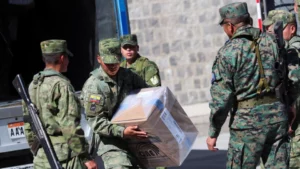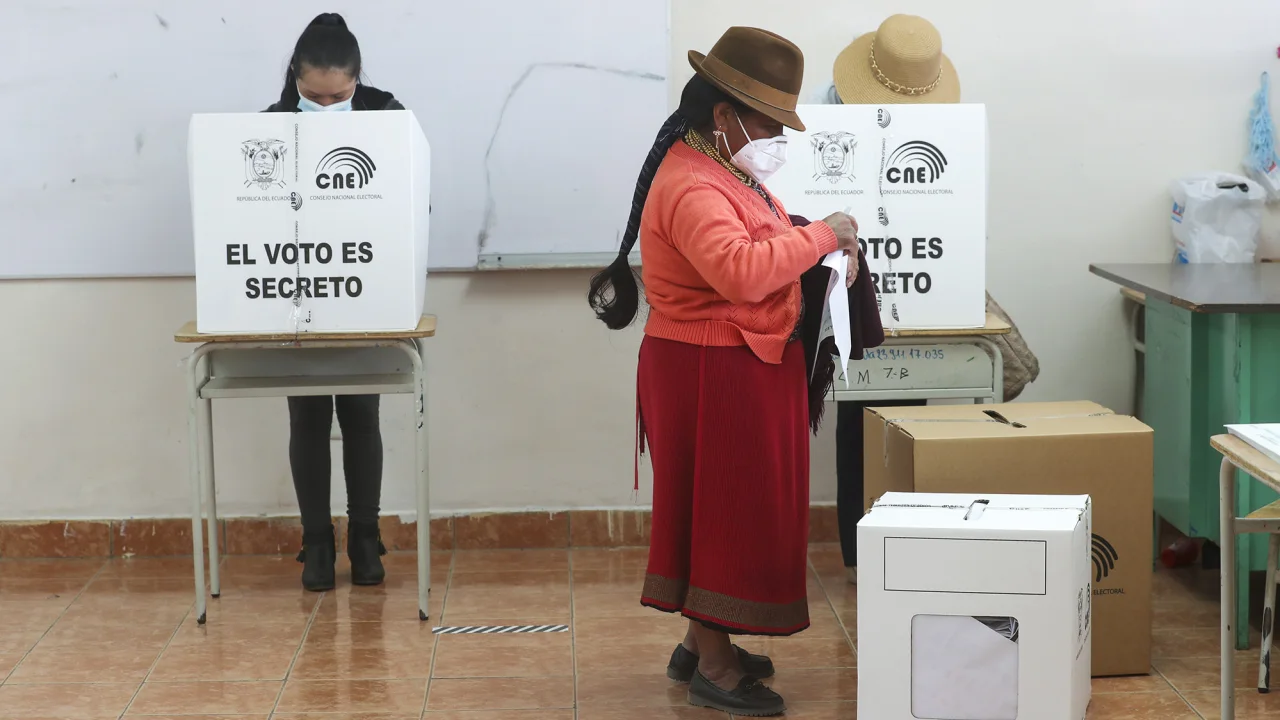Ecuadorian voters are heading to the polls on Sunday, August 20, for an early presidential election, disrupted by the assassination of one of the main candidates, against the backdrop of an unprecedented wave of violence linked to the expanding drug trade.
The vote takes place twelve days after the execution in Quito, by a commando of Colombian hitmen, of centrist candidate Fernando Villavicencio, a 59-year-old former journalist who was in second place in the polls.

A soldier transports ballot boxes and voting materials to a school serving as a polling station before the presidential election in Quito, Ecuador, on August 19, 2023. © Henry Romero, Reuters
The assassination has traumatized the country and reshuffled the deck for an election in which none of the eight candidates now seem capable of winning an absolute majority and avoiding a second round on October 15.
Violence and institutional crisis
Long considered an oasis of peace in Latin America, renowned for its bananas, pink shrimp, and Galapagos Islands, Ecuador has been affected in recent years by drug trafficking from neighboring Colombia and Peru (the main cocaine-producing countries), sponsored by Mexican cartels. It has now reached a point where it threatens the stability of institutions and resembles the bloody Colombia of the 1990s under the late drug lord Pablo Escobar.
While the Pacific coast – and its strategic port of Guayaquil – has long been the epicenter of violence, Quito now lives in a state of paranoia, with a national homicide rate that doubled in 2022 and is set to break records this year. Since 2021, over 430 inmates have also been killed in massacres between rival gangs in the country’s prisons.
In addition to this violence, there is an institutional crisis that has left the country without a Congress for the past three months, when unpopular outgoing conservative President Guillermo Lasso decided to dissolve it and call for early elections to avoid being impeached for corruption.
“Voting with three sentiments”
“Ecuadorians will vote with three sentiments,” summarizes Santiago Cahuasqui, a political scientist at the International SEK University, to AFP: “fear of insecurity, pessimism about the economic situation, and distrust of the political class.”
Approximately 13.4 million voters out of 18.3 million Ecuadorians are called to vote between 7 a.m. and 5 p.m. local time (12 p.m. and 10 p.m. GMT) to elect the president and vice president, as well as the 137 members of the unicameral Congress. The new president will be elected for a little over a year, until May 2025, which corresponds to the theoretical end of Guillermo Lasso’s term.
A socialist lawyer who is fond of tattoos, a journalist designated at the last minute to replace his friend who was killed, and a former French Foreign Legion sniper will compete for the votes of the electorate, among eight candidates who live in fear of an attack and only go out wearing bulletproof vests and under armed escort.
Due to a lack of time to print new ballots, the face of the late Fernando Villavicencio will still appear on the ballots of his last-minute replacement, journalist Christian Zurita.
Christian Zurita, the best friend and colleague of Fernando Villavicencio, has been involved in all investigations that have uncovered major corruption scandals. The most high-profile of these investigations led to the conviction of former socialist president Rafael Correa (2007-2017) to eight years in prison, forcing him into exile.
“The relay is an ethical necessity… I will do my best to honor your word, your conscience, your thoughts, your ethics, your moral stature,” candidate Zurita, 53, declared to AFP, promising to fully implement his murdered friend’s anti-corruption program if he wins.
Oil exploitation in the Amazon jungle
His rival, and the only woman in the presidential race, Luisa Gonzalez, 45, is a close ally of Correa, whom she served as an advisor for a long time. She has stated that she would make the exiled former president her advisor in the event of victory.
Luisa Gonzalez was the favorite in the polls until the assassination of Fernando Villavicencio. But the tragic death of the former journalist “has exacerbated the anti-Correa sentiment,” according to Santiago Cahuasqui.
Behind Luisa Gonzalez and Christian Zurita are former sniper and paratrooper Jan Topic (right-wing), indigenous leader Yaku Pérez (left-wing), and former vice president Otto Sonnenholzner (right-wing), according to polls from early August.
The short election campaign has been marked by three other assassinations: a mayor of a major port, a congressional candidate, and a local Correa leader.
Dubbed the “Ecuadorian Bukele” in reference to the Salvadoran strongman Nayib Bukele, 40-year-old Jan Topic, a former member of the French Foreign Legion, is the candidate who, after the assassination of Fernando Villavicencio, seems to have gained popularity among voters, attracted by his tough stance against crime.
As the country has been under a state of emergency for over a week, military and police personnel will be deployed throughout the territory for Sunday’s vote. The first results are expected to be published overnight by the electoral authority.
On this Sunday, voters are also casting their ballots in a referendum on the continuation of oil exploitation in the Yasuni Amazon jungle (northeast), an indigenous land and a unique biodiversity reserve. It is a “historic” consultation in the eyes of environmental and indigenous rights defenders.
With AFP
